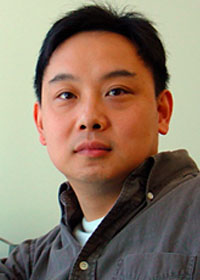Xiaozhong Wang, PhD
Professor, Molecular Biosciences; Judd A. and Marjorie Weinberg College of Arts and Sciences

Research Program
Cancer-Focused Research
Genetic manipulations in mouse embryonic cells provide a very useful platform to unveil in vivo functions of human genes, particularly for those health-related genes such as cancers. The Wang laboratory is mainly working on two areas: cell-cell adhesion and stem cell proliferation/differentiation. Dr. Wang uses molecular and genetic approaches to study the function of cadherin-like superfamily cell adhesion molecules-protocadherins. Cadherins and their downstream signaling pathways have been implicated in the cause and progression of a variety of human cancers. Using the mouse genetic models developed in the Wang lab, the role of these cadherin-like molecules in the development of brain tumors is under investigation. A second focus of the Wang lab is on understanding the global regulatory mechanisms of embryonic stem cell proliferation and differentiation. Elucidating such mechanisms will provide a better understanding the origin and regulation of newly identified tumor stem cells.
